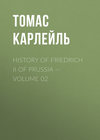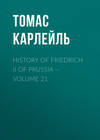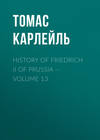Czytaj książkę: «History of Friedrich II of Prussia — Volume 02», strona 7
Chapter X. — BRANDENBURG LAPSES TO THE KAISER
Two years before the victory at Muhldorf, a bad chance befell in Brandenburg: the ASCANIER Line of Markgraves or Electors ended. Magniloquent Otto with the Arrow, Otto the Short, Hermann the Tall, all the Ottos, Hermanns and others, died by course of nature; nephew Waldemar himself, a stirring man, died prematurely (A.D. 1319), and left only a young cousin for successor, who died few months after: [September, 1320 (Pauli, i. 391). Michaelis, i. 260-277.] the Line of Albert the Bear went out in Brandenburg. They had lasted there about two hundred years. They had not been, in late times, the successfulest Markgraves: territories much split up among younger sons, joint Markgraves reigning, which seldom answers; yet to the last they always made stout fight for themselves; walked the stage in a high manner; and surely might be said to quit it creditably, leaving such a Brandenburg behind them, chiefly of their making, during the Two Centuries that had been given them before the night came.
There were plenty of Ascanier Cousins still extant in those parts, Saxon dignitaries, Anhalt dignitaries, lineal descendants of Albert the Bear; to some of whom, in usual times, Albert's inheritance would naturally have been granted. But the times were of battle, uncertainty, contested election: and the Ascaniers, I perceive, had rather taken Friedrich of Austria's side, which proved the losing one. Kaiser Ludwig DER BAIER would appoint none of these; Anti-Kaiser Friedrich's appointments, if he made any, could be only nominal, in those distant Northern parts. Ludwig, after his victory of Muhldorf, preferred to consider the Electorate of Brandenburg as lapsed, lying vacant, ungoverned these three years; and now become the Kaiser's again. Kaiser, in consequence, gave it to his Son; whose name also is Ludwig: the date of the Investiture is 1323 (year after that victory of Muhldorf); a date unfortunate to Brandenburg. We come now into a Line of BAVARIAN Markgraves, and then of LUXEMBURG ones; both of which are of fatal significance to Brandenburg.
The Ascanier Cousins, high Saxon dignitaries some of them, gloomed mere disappointment, and protested hard; but could not mend the matter, now or afterwards. Their Line went out in Saxony too, in course of time; gave place to the WETTINS, who are still there. The Ascanier had to be content with the more pristine state of acquisitions,—high pedigrees, old castles of Ascanien and Ballenstadt, territories of Anhalt or what else they had;—and never rose again to the lost height, though the race still lives, and has qualities besides its pedigree. We said the "Old Dessauer," Leopold Prince of Anhalt-Dessau, was the head of it in Friedrich Wilhelm's time; and to this day he has descendants. Catharine II. of Russia was of Anhalt-Zerbst, a junior branch. Albert the Bear, if that is of any use to him, has still occasionally notable representatives.
Ludwig junior, Kaiser Ludwig the Bavarian's eldest son, was still under age when appointed Kurfurst of Brandenburg in 1323: of course he had a "STATEHOLDER" (Viceregent, STATTHALTER); then, and afterwards in occasional absences of his, a series of such, Kaiser's Councillors, Burggraf Friedrich IV. among them, had to take some thought of Brandenburg in its new posture. Who these Brandenburg Statthalters were, is heartily indifferent even to Dryasdust,—except that one of them for some time was a Hohenzollern: which circumstance Dryasdust marks with the due note of admiration. "What he did there," Dryasdust admits, "is not written anywhere;"—good, we will hope, and not evil;—but only the Diploma nominating him (of date 1346, not in Ludwig's minority, but many years after that ended [Rentsch, p. 323.]) now exists by way of record. A difficult problem he, like the other regents and viceregents, must have had; little dreaming that it was intrinsically for a grandson of his own, and long line of grandsons. The name of this temporary Statthalter, the first Hohenzollern who had ever the least concern with Brandenburg, is Burggraf Johann II., eldest Son of our distinguished Muhldorf friend Friedrich IV.; and Grandfather (through another Friedrich) of Burggraf Friedrich VI.,—which last gentleman, as will be seen, did doubtless reap the sowings, good and bad, of all manner of men in Brandenburg. The same Johann II. it was who purchased Plassenburg Castle and Territory (cheap, for money down), where the Family afterwards had its chief residence. Hof, Town and Territory, had fallen to his Father in those parts; a gift of gratitude from Kaiser Ludwig:—most of the Voigtland is now Hohenzollern.
Kaiser Ludwig the Bavarian left his sons Electors of Brandenburg;—"Electors, KURFURSTS," now becomes the commoner term for so important a Country;—Electors not in easy circumstances. But no son of his succeeded Ludwig as Kaiser,—successor in the Reich was that Pfaffen-Kaiser, Johann of Bohemia's son, a Luxemburger once more. No son of Ludwig's; nor did any descendant,—except, after four hundred years, that unfortunate Kaiser Karl VII., in Maria Theresa's time. He was a descendant. Of whom we shall hear more than enough. The unluckiest of all Kaisers, that Karl VII.; less a Sovereign Kaiser than a bone thrown into the ring for certain royal dogs, Louis XV., George II. and others, to worry about;—watch-dogs of the gods; apt sometimes to run into hunting instead of warding.—We will say nothing more of Ludwig the Baier, or his posterity, at present: we will glance across to Preussen, and see, for one moment, what the Teutsch Ritters are doing in their new Century. It is the year 1330; Johann II. at Nurnberg, as yet only coming to be Burggraf, by no means yet administering in Brandenburg; and Ludwig junior seven years old in his new dignity there.
The Teutsch Ritters, after infinite travail, have subdued heathen Preussen; colonized the country with industrious German immigrants; banked the Weichsel and the Nogat, subduing their quagmires into meadows, and their waste streams into deep ship-courses. Towns are built, Konigsberg (KING Ottocar's TOWN), Thoren (Thorn, CITY of the GATES), with many others: so that the wild population and the tame now lived tolerably together, under Gospel and Lubeck Law; and all was ploughing and trading, and a rich country; which had made the Teutsch Ritters rich, and victoriously at their ease in comparison. But along with riches and the ease of victory, the common bad consequences had ensued. Ritters given up to luxuries, to secular ambitions; ritters no longer clad in austere mail and prayer; ritters given up to wantonness of mind and conduct; solemnly vowing, and quietly not doing; without remorse or consciousness of wrong, daily eating forbidden fruit; ritters swelling more and more into the fatted-ox condition, for whom there is but one doom. How far they had carried it, here is one symptom that may teach us.
In the year 1330, one Werner von Orseln was Grand-master of these Ritters. The Grand-master, who is still usually the best man they can get, and who by theory is sacred to them as a Grand-Lama or Pope among Cardinal-Lamas, or as an Abbot to his Monks,—Grand-master Werner, we say, had lain down in Marienburg one afternoon of this year 1330, to take his siesta, and was dreaming peaceably after a moderate repast, when a certain devil-ridden mortal, Johann von Endorf, one of his Ritters, long grumbling about severity, want of promotion and the like, rushed in upon the good old man; ran him through, dead for a ducat; [Voigt, iv. 474, 482.]—and consummated a PARRICIDE at which the very cross on one's white cloak shudders! Parricide worse, a great deal, than that at the Ford of Reuss upon one-eyed Albert.
We leave the shuddering Ritters to settle it, sternly vengeful; whom, for a moment, it has struck broad-awake to some sense of the very questionable condition they are getting into.
Chapter XI. — BAYARIAN KURFURSTS IN BRANDENBURG
Young Ludwig Kurfurst of Brandenburg, Kaiser Ludwig's eldest son, having come of years, the Tutors or Statthalters went home,—not wanted except in cases of occasional absence henceforth;—and the young man endeavored to manage on his own strength. His success was but indifferent; he held on, however, for a space of twenty years, better or worse. "He helped King Edward III. at the Siege of Cambray (A.D. 1339);" [Michaelis, i. 279.] whose French politics were often connected with the Kaiser's: it is certain, Kurfurst Ludwig "served personally with 600 horse [on good payment, I conclude] at that Siege of Cambray;"—and probably saw the actual Black Prince, and sometimes dined with him, as English readers can imagine. In Brandenburg he had many checks and difficult passages, but was never quite beaten out, which it was easy to have been.
A man of some ability, as we can gather, though not of enough: he played his game with resolution, not without skill; but from the first the cards were against him. His Father's affairs going mostly ill were no help to his, which of themselves went not well. The Brandenburgers, mindful of their old Ascanier sovereigns, were ill affected to Ludwig and the new Bavarian sort. The Anhalt Cousinry gloomed irreconcilable; were never idle, digging pitfalls, raising troubles. From them and others Kurfurst Ludwig had troubles enough; which were fronted by him really not amiss; which we wholly, or all but wholly, omit in this place.
A RESUSCITATED ASCANIER; THE FALSE WALDEMAR
The wickedest and worst trouble of their raising was that of the resuscitated Waldemar (A.D. 1345): "False Waldemar," as he is now called in Brandenburg Books. Waldemar was the last, or as good as the last, of the Ascanier Markgraves; and he, two years before Ludwig ever saw those countries, died in his bed, twenty-five good years ago; and was buried, and seemingly ended. But no; after twenty-five years, Waldemar reappears: "Not buried or dead, only sham-buried, sham-dead; have been in the Holy Land all this while, doing pilgrimage and penance; and am come to claim my own again,—which strangers are much misusing!" [Michaelis, i. 279.]
Perkin Warbeck, POST-MORTEM Richard II., Dimitri of Russia, Martin Guerre of the CAUSES CELEBRES: it is a common story in the world, and needs no commentary now. POST-MORTEM Waldemar, it is said, was a Miller's Man, "of the name of Jakob Rehback;" who used to be about the real Waldemar in a menial capacity, and had some resemblance to him. He showed signets, recounted experiences, which had belonged to the real Waldemar. Many believed in his pretension, and took arms to assert it; the Reich being in much internal battle at the time; poor Kaiser Ludwig, with his Avignon Popes and angry Kings Johann, wading in deep waters. Especially the disaffected Cousinry, or Princes of Anhalt, believed and battled for POST-MORTEM Waldemar; who were thought to have got him up from the first. Kurfurst Ludwig had four or five most sad years with him;—all the worse when the PFAFFEN-KAISER (King Johann's son) came on the stage, in the course of them (A.D. 1346), and Kaiser Ludwig, yielding not indeed to him, but to Death, vanished from it two years after; [Elected, 1314; Muhldorf, and Election COMPLETE, 1322; died, 1347, age 60.] leaving Kurfurst Ludwig to his own shifts with the Pfaffen-Kaiser. Whom he could not now hinder from succeeding to the Reich. He tried hard; set up, he and others, an Anti-Kaiser (GUNTHER OF SCHWARTZBURG, temporary Anti-Kaiser, whom English readers can forget again): he bustled, battled, negotiated, up and down; and ran across, at one time, to Preussen to the Teutsch Ritters,—presumably to borrow money:—but it all would not do. The Pfaffen-Kaiser carried it, in the Diet and out of the Diet: Karl IV. by title; a sorry enough Kaiser, and by nature an enemy of Ludwig's.
It was in this whirl of intricate misventures that Kurfurst Ludwig had to deal with his False Waldemar, conjured from the deeps upon him, like a new goblin, where already there were plenty, in the dance round poor Ludwig. Of which nearly inextricable goblin-dance; threatening Brandenburg, for one thing, with annihilation, and yet leading Brandenburg abstrusely towards new birth and higher destinies,—how will it be possible (without raising new ghosts, in a sense) to give readers any intelligible notion?—Here, flickering on the edge of conflagration after duty done, is a poor Note which perhaps the reader had better, at the risk of superfluity, still in part take along with him:—
"Kaiser Henry VII., who died of sacramental wine, First of the Luxemburg Kaisers, left Johann still a boy of fifteen, who could not become the second of them, but did in time produce the Second, who again produced the Third and Fourth.
"Johann was already King of Bohemia; the important young gentleman, Ottocar's grandson, whom we saw 'murdered at Olmutz none yet knows by whom,' had left that throne vacant, and it lapsed to the Kaiser; who, the Nation also favoring, duly put in his son Johann. There was a competitor, 'Duke of the Tyrol,' who claimed on loose grounds; 'My wife was Aunt of the young murdered King,' said he; 'wherefore'—! Kaiser, and Johann after him, rebutted this competitor; but he long gave some trouble, having great wealth and means. He produced a Daughter, Margaret Heiress of the Tyrol,—with a terrible MOUTH to her face, and none of the gentlest hearts in her body:—that was perhaps his principal feat in the world. He died 1331; had styled himself 'King of Bohemia' for twenty years,—ever since 1308;—but in the last two years of his life he gave it up, and ceased from troubling, having come to a beautiful agreement with Johann.
"Johann, namely, wedded his eldest Son to this competitor's fine Daughter with the mouth (Year 1329): 'In this manner do not Bohemia and the Tyrol come together in my blood and in yours, and both of us are made men?' said the two contracting parties.—Alas, no: the competitor Duke, father of the Bride, died some two years after, probably with diminished hopes of it; and King Johann lived to see the hope expire dismally altogether. There came no children, there came no—In fact Margaret, after a dozen years of wedlock, in unpleasant circumstances, broke it off as if by explosion; took herself and her Tyrol irrevocably over to Kaiser Ludwig, quite away from King Johann,—who, his hopes of the Tyrol expiring in such dismal manner, was thenceforth the bitter enemy of Ludwig and what held of him."
Tyrol explosion was in 1342. And now, keeping these preliminary dates and outlines in mind, we shall understand the big-mouthed Lady better, and the consequences of her in the world.
MARGARET WITH THE POUCH-MOUTH
What principally raised this dance of the devils round poor Ludwig, I perceive, was a marriage he had made, three years before Waldemar emerged; of which, were it only for the sake of the Bride's name, some mention is permissible. Margaret of the Tyrol, commonly called, by contemporaries and posterity, MAULTASCHE (Mouthpoke, Pocket-mouth), she was the bride:—marriage done at Innspruck, 1342, under furtherance of father Ludwig the Kaiser:—such a mouth as we can fancy, and a character corresponding to it. This, which seemed to the two Ludwigs a very conquest of the golden-fleece under conditions, proved the beginning of their worst days to both of them.
Not a lovely bride at all, this Maultasche; who is verging now towards middle life withal, and has had enough to cross her in the world. Was already married thirteen years ago; not wisely nor by any means too well. A terrible dragon of a woman. Has been in nameless domestic quarrels; in wars and sieges with rebellious vassals; claps you an iron cap on her head, and takes the field when need is: furious she-bear of the Tyrol. But she has immense possessions, if wanting in female charms. She came by mothers from that Duke of Meran whom we saw get his death (for cause), in the Plassenburg a hundred years ago. [Antes, p.102.] Her ancestor was Husband to an Aunt of that homicided Duke: from him, principally from him, she inherits the Tyrol, Carinthia, Styria; is herself an only child, the last of a line: hugest Heiress now going. So that, in spite of the mouth and humor, she has not wanted for wooers,—especially prudent Fathers wooing her for their sons.
In her Father's lifetime, Johann King of Bohemia, always awake to such symptoms of things, and having very peculiar interests in this case, courted and got her for his Crown-Prince (as we just saw), a youth of great outlooks, outlooks towards Kaisership itself perhaps; to whom she was wedded, thirteen years ago, and duly brought the Tyrol for Heritage: but with the worst results. Heritage, namely, could not be had without strife with Austria, which likewise had claims. Far worse, the marriage itself went awry: Johann's Crown-Prince was "a soft-natured Herr," say the Books: why bring your big she-bear into a poor deer's den? Enough, the marriage came to nothing, except to huge brawlings far enough away from us: and Margaret Pouch-mouth has now divorced her Bohemian Crown-Prince as a Nullity; and again weds, on similar terms, Kaiser Ludwig's son, our Brandenburg Kurfurst,—who hopes possibly that HE now may succeed as Kaiser, on the strength of his Father and of the Tyrol. Which turned out far otherwise.
The marriage was done in the Church of Innspruck, 10th February, 1342 (for we love to be particular), "Kaiser Ludwig," happy man, "and many Princes of the Empire, looking on;" little thinking what a coil it would prove. "At the high altar she stript off her veil," symbol of wifehood or widowhood, "and put on a JUNGFERNKRANZ (maiden's-garland)," symbolically testifying how happy Ludwig junior still was. They had a son by and by; but their course otherwise, and indeed this-wise too, was much checkered.
King Johann, seeing the Tyrol gone in this manner, gloomed terribly upon his Crown-Prince; flung him aside as a Nullity, "Go to Moravia, out of sight, on an apanage, you; be Crown-Prince no longer!"—And took to fighting Kaiser Ludwig; colleagued diligently with the hostile Pope, with the King of France; intrigued and colleagued far and wide; swearing by every method everlasting enmity to Kaiser Ludwig; and set up his son Karl as Pfaffen-Kaiser. Nay, perhaps he was at the bottom of POST-OBIT Waldemar too. In brief, he raised, he mainly, this devils'-dance, in which, Kaiser Ludwig having died, poor Kurfurst Ludwig, with Maultasche hanging on him, is sometimes near his wits' end.
Johann's poor Crown-Prince, finding matters take this turn, retired into MAHREN (Moravia) as bidden; "Margrave of Mahren;" and peaceably adjusted himself to his character of Nullity and to the loss of Maultasche;—chose, for the rest, a new Princess in wedlock, with more moderate dimensions of mouth; and did produce sons and daughters on a fresh score. Produced, among others, one Jobst his successor in the apanage or Margrafdom; who, as JOBST, or Jodocus, OF MAHREN, made some noise for himself in the next generation, and will turn up again in reference to Brandenburg in this History.
As for Margaret Pouch-mouth, she, with her new Husband as with her old, continued to have troubles, pretty much as the sparks fly upwards. She had fierce siegings after this, and explosive procedures,—little short of Monk Schwartz, who was just inventing gunpowder at the time. We cannot hope she lived in Elysian harmony with Kurfurst Ludwig;—the reverse, in fact; and oftenest with the whole breadth of Germany between them, he in Brandenburg, she in the Tyrol. Nor did Ludwig junior ever come to be Kaiser, as his Father and she had hoped; on the contrary, King Johann of Bohemia's people,—it was they that next got the Kaisership and kept it; a new provocation to Maultasche.
Ludwig and she had a son, as we said; Prince of the Tyrol and appendages, titular Margraf of Mahren and much else, by nature: but alas, he died about ten; a precocious boy,—fancy the wild weeping of a maternal She-bear! And the Father had already died; [In 1361, died Kurfurst Ludwig; 1363, the Boy; 1366, Maultasche herself.] a malicious world whispering that perhaps she poisoned them BOTH. The proud woman, now old too, pursed her big coarse lips together at such rumor, and her big coarse soul,—in a gloomy scorn appealing beyond the world; in a sorrow that the world knew not of. She solemnly settled her Tyrol and appendages upon the Austrian Archdukes, who were children of her Mother's Sister; whom she even installed into the actual government, to make matters surer. This done, she retired to Vienna, on a pension from them, there to meditate and pray a little, before Death came; as it did now in a short year or two. Tyrol and the appendages continue with Austria from that hour to this, Margaret's little boy having died.
Margaret of the Pouch-mouth, rugged dragoon-major of a woman, with occasional steel cap on her head, and capable of swearing terribly in Flanders or elsewhere, remains in some measure memorable to me. Compared with Pompadour, Duchess of Cleveland, of Kendal and other high-rouged unfortunate females, whom it is not proper to speak of without necessity, though it is often done,—Maultasche rises to the rank of Historical. She brought the Tyrol and appendages permanently to Austria; was near leading Brandenburg to annihilation, raising such a goblin-dance round Ludwig and it, yet did abstrusely lead Brandenburg towards a far other goal, which likewise has proved permanent for it.




















